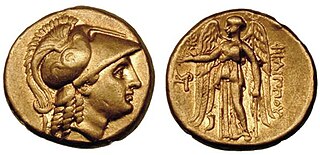Related Research Articles
This article concerns the period 319 BC – 310 BC.

This article concerns the period 309 BC – 300 BC.
Year 310 BC was a year of the pre-Julian Roman calendar. At the time, it was known as the Year of the Consulship of Rullianus and Censorinus. The denomination 310 BC for this year has been used since the early medieval period, when the Anno Domini calendar era became the prevalent method in Europe for naming years.
Year 317 BC was a year of the pre-Julian Roman calendar. At the time, it was known as the Year of the Consulship of Brutus and Barbula. The denomination 317 BC for this year has been used since the early medieval period, when the Anno Domini calendar era became the prevalent method in Europe for naming years.
Year 311 BC was a year of the pre-Julian Roman calendar. At the time, it was known as the Year of the Consulship of Brutus and Barbula. The denomination 311 BC for this year has been used since the early medieval period, when the Anno Domini calendar era became the prevalent method in Europe for naming years.

Seleucus I Nicator was a Macedonian Greek general, officer and successor of Alexander the Great who went on to found the eponymous Seleucid Empire, led by the Seleucid dynasty. Initially a secondary player in the power struggles following Alexander's death, Seleucus rose to become the total ruler of Asia Minor, Syria, Mesopotamia, and the Iranian plateau, assuming the title of basileus (king). The Seleucid Empire was one of the major powers of the Hellenistic world, until it was overcome by the Roman Republic and Parthian Empire in the late second and early first centuries BC.

Antigonus I Monophthalmus was a Macedonian Greek general and successor of Alexander the Great. A prominent military leader in Alexander's army, he went on to control large parts of Alexander's former empire. He assumed the title of basileus (king) in 306 BC and reigned until his death. He was the founder of the Antigonid dynasty, which ruled over Macedonia until its conquest by the Roman Republic in 168 BC.

The Battle of Ipsus was fought between some of the Diadochi in 301 BC near the town of Ipsus in Phrygia. Antigonus I Monophthalmus, the Macedonian ruler of large parts of Asia, and his son Demetrius were pitted against the coalition of three other successors of Alexander: Cassander, ruler of Macedon; Lysimachus, ruler of Thrace; and Seleucus I Nicator, ruler of Babylonia and Persia.

The Wars of the Diadochi or Wars of Alexander's Successors were a series of conflicts fought between the generals of Alexander the Great, known as the Diadochi, over who would rule his empire following his death. The fighting occurred between 322 and 281 BC.

Eumenes was a Greek general, satrap, and Successor of Alexander the Great. He participated in the Wars of Alexander the Great, serving as Alexander's personal secretary and later on as a battlefield commander. Eumenes depicted himself as a lifelong loyalist of Alexander's dynasty and championed the cause of the Macedonian Argead royal house.

The naval Battle of Salamis in 306 BC took place off Salamis, Cyprus between the fleets of Ptolemy I of Egypt and Antigonus I Monophthalmus, two of the Diadochi, the generals who, after the death of Alexander the Great, fought each other for control of his empire.
Peithon or Pithon was the son of Crateuas, a nobleman from Eordaia in western Macedonia. He was famous for being one of the bodyguards of Alexander the Great, becoming the later satrap of Media, and claiming to be one of the diadochi.

Battle of Gabiene was the second great battle between Antigonus Monophthalmus and Eumenes, two of Alexander the Great's successors. The battle was fought near Gabiene in Persia in the winter of 316-315 BC and ended the Second War of the Diadochi. It established Antigonus as the most powerful of the successors.
Nicanor was a Macedonian officer of distinction who served as satrap of Media under Antigonus.
The Second War of the Diadochi was the conflict between the coalition of Polyperchon, Olympias and Eumenes and the coalition of Cassander, Antigonus, Ptolemy and Lysimachus following the death of Cassander's father, Antipater.
The Babylonian War was a conflict fought between 311–309 BC between Antigonus I Monophthalmus and Seleucus I Nicator, ending in a victory for Seleucus. This conflict ended any possibility of restoration of the former empire of Alexander the Great, a result confirmed in the Battle of Ipsus. The battle also marked the birth of the Seleucid Empire by giving Seleucus control over the eastern satrapies of Alexander's former territory.
The Battle of Byzantium (Byzantion) was a 317 BC engagement between the generals Antigonus Monopthalmus and Cleitus the White, during the Second War of the Diadochi. Fought over the course of two days, near Byzantium at the Hellespont, it resulted in a stunning Antigonid victory.
The battle of the 25 of Abu of 309 B.C. in an unknown location between Babylon and Susa, was the decisive and final clash of the Babylonian war. It ended in a Seleucid victory, and the establishment of the Seleucid kingdom.
The First Siege of Babylon was a successful siege of one of its citadels, loyal to Antigonus, by forces under Seleucus in 311 BC.
The Second siege of Babylon took place during the Babylonian War in 310 BC. Antigonid forces under Antigonus's oldest son, Demetrius, besieged the Seleucid garrison of the city of Babylon under the command of Patrocles.
References
Diodorus 19.92, 100; Appian Syriaca. 55.
Diodorus of Sicily (World History, 19.90-93)
https://www.livius.org/sources/content/diodorus/the-beginning-of-the-babylonian-war/
Antigonus the One-Eyed: Greatest of the Successors by Jeff Champions